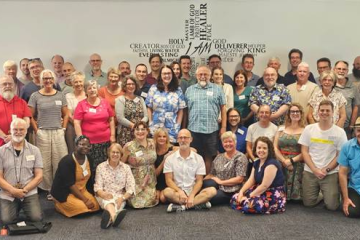Rejoice in the Lord – always. – Philippians 4:1-7
Poor Euodia and Syntyche! What a way to be remembered for posterity!
I was tempted, when I was planning this series to skip the beginning of chapter 4, but as I did more reading, I was intrigued by the fact that even the commentators disagree about this disagreement.
Some say, these women are fighting because women, left to themselves, fight. (Last week we shouted ‘Hallelujah’s’ as audience interaction. I feel like that statement deserves a boo!) Others say this is blatant sexism (Hallelujah!) and we are reading an account of a disagreement into the text. That you can do an alternate reading where they are not in disagreement, where Paul’s direction in verse 2 to, “Be of one mind,” is simply, as it is in chapter 2, verse 2, encouragement to keep doing what they are doing – these women leaders who rightly deserve support, who are Paul’s co-workers. And a third group (while accepting that these verses describe a conflict) highlight the very pastoral way Paul handles it. Not telling them to just kiss and make up or shake hands and get on with it, but by doing theology with them – reminding them, as we heard last week, to “Rejoice in the Lord always”. A theological foundation so nice you say it twice – “again I say, Rejoice.”
My view is that all these ways of interpreting Philippians 4:2-3 have some truth to them – even the not so nice observation that sometimes women are women’s worst enemies. Madeline Albright, the first female US Secretary of State, put it, famously, “There is a special place in hell for women who don’t help other women.”
But why are women, sometimes, not prepared to help each other? I really appreciated Julia Gillard and Ngozi Okonjo-Iweala’s book, Women and Leadership, and their exploration of this question. They quote Abby Wambach, two-time Olympic gold medal winner and second highest scoring professional soccer player – male or female – of all time. In a graduation speech at Barnard College, New York, she said:
“During every… match there are a few magical moments when the ball actually hits the back of the net and a goal is scored… Teammates from all over the field rush toward the goal scorer. It appears we’re celebrating her, but what we’re really celebrating is every player, every coach, every practice, every sprint, every doubt, and every failure that this one single goal represents.
You will not always be the goal scorer. And when you are not, you better be rushing toward her.
Women must champion each other. This can be difficult for us. Women have been pitted against each other since the beginning of time for that one seat at the table. Scarcity has been planted inside of us and among us. This scarcity is not our fault. But it is our problem.”
In Gillard and Okonjo-Iwaela’s research they found it is not the women who have reached the top who hold other women back, but social group norms, perceptions of how many women should be in leadership. ‘Twokenism’ was the word coined by a study of companies on the Standard & Poor’s 1500 index. It found that boards very frequently had two female members. The perception was that one woman could be called tokenism, but more than two was too many! It is this manufactured scarcity – only one or two seats for women – that creates competition among women.
I am labouring this point, but I saw ‘twokenism’ in action this week. I was at a meeting to plan the church service for the Opening of Parliament. “We’ve had two women preachers in a row,” we were told, “so we can’t have another woman for a while.” “So, what you are saying,” I said, “is that male speakers are the norm, but female speakers are an anomaly?” “No, no, of course not,” I was told, “but women are seen as a greater potential political risk.” (Does that deserve a boo or hallelujah? As the Spirit leads!)
But I think we all (although women and minorities experience it in particular ways) we all struggle with perceptions of scarcity, with anxieties, with fears, in ways that lead to conflict with others. This is not just a women’s problem. It is an everyone problem.
But Paul has a cure for us. “Rejoice in the Lord always; again I will say, Rejoice.” He is not simply saying, “Don’t worry, be happy!” but reminding the Philippians again (he’s done this previously in Philippians) that our fundamental theological reality is that our identity is now in Christ, because of all Christ has done for us! “Since we are justified by faith (Romans 5) wehave peace with God… we have obtained accessto this grace…we[share] in hope… [and] we…. boast in our afflictions… because God’s love has been poured into our hearts through the Holy Spirit….” Amazing, abundant grace. Mary Oliver is both wrong and right, In God much can be redeemed, so we should not, “be afraid of [love’s] plenty. Joy was not made to be a crumb.”
Paul lives out this abundant grace in his response to these women leaders. He doesn’t treat them as bad women, as fallen women, as disgraced women. They are not punished more harshly for their errors than men (as is usually the case, Gillard and Okonjo-Iweala find in their research.) He calls them his “joy and crown”. He asks his companion to support them. He states that rather than there being a special place in hell for them, their names, with the rest of his co-workers, are in the book of life.
There is a wonderful story about former President Jimmy Carter (whose hand I had the chance to shake at the Baptist World Congress in 1985!) attending Hubert Humphrey’s funeral in 1978. There were hundreds of people there, but when former President Richard Nixon entered, having just dragged his country through the humiliation and shame of Watergate, conversations dried up and people turned away.
Carter saw Nixon standing alone and walked towards him. He held out his hands and, smiling genuinely and broadly, embraced him and said, “Welcome home, Mr President! Welcome home!” Newsweek magazine reported “If there was a turning point in Nixon’s long ordeal in the wilderness it was that moment and that gesture of love and compassion.” Carter was known for his integrity and genuine Christian faith – a faith demonstrated by genuine and generous grace.
“Let your gentleness,” Paul says in verse 5, “be known to everyone.” ‘Gentleness’ here is a tricky word to translate. It can mean ‘reasonableness, fairmindedness’. It can mean ‘magnanimity, mercifulness’. Perhaps the best translation is ‘graciousness’. As Luke 6:36 says, “Be merciful just as you Father is merciful. Do not judge, and you will not be judged; do not condemn, and you will not be condemned. Forgive, and you will be forgiven.” As recipients of abundant grace, we are to be graceful, gentle people.
Because we live our lives in the light of a new reality, “The Lord is near.” Therefore, we can draw on the rich resources of grace, our God who comes near to us, our God who is near to us! This is the antidote to a mindset of scarcity and anxiety and fear – the open-door between us and God. “Do not worry about anything,” says Paul (not that concerns won’t arise, but that we can turn them over to God), “but in everything by prayer and supplication with thanksgiving let your requests be known to God.”
But wait, there’s more to this grace! In addition to abundant grace, abundant help to be gracious, abundant openness, there is abundant peace – a peace surpassing all understanding. We do not have to fear. We do not have to defend ourselves. We do not have to be anxious. Because the peace of God guards us. It guards our hearts and minds in Christ Jesus.
This is a time of conflict in our world, in our country, in our wider Baptist family and in many areas of our own lives. Conflict is inevitable. It is, as I said, an everyone problem. Conflict is inevitable, someone said to me the other week, but combat is optional. Paul enjoins us, rather than fighting, to rejoice in the Lord. To, as Mary Oliver says, “If [we] suddenly and unexpectedly feel joy, don’t hesitate. Give in to it.” To rejoice that we are God’s. To rejoice that God’s grace remakes us as good and gentle people. To rejoice that God’s grace is there for us in everything. To rejoice that in God’s grace we know peace.
“Stand firm,” says Paul, “in the Lord in this way.” There is no other way.
I read this extraordinary poem by Padraig O Tuama this week, leader of the Corrymeela Community in Ireland who has worked in conflict resolution in Ireland, Africa and the Middle East. It’s called Shaking Hands.
Because what’s the alternative?
Because of courage.
Because of loved ones lost.
Because no more.
Because it’s a small thing: shaking hands; it happens every day.
Because I heard of one man whose hands haven’t stopped shaking since a market day in Omagh.
Because it takes a second to say hate, but it takes longer, much longer to be a great leader.
Much, much longer.
Because shared space without human touching doesn’t amount to much.
Because its easier to speak to your own than to hold the hand of someone whose side has been previously described, proscribed, denied.
Because it is touch.
Because it is tough.
Because it is meant to be tough, and this is the stuff of memory, the stuff of hope, the stuff of gesture, and meaning and leading.
Because it has taken so, so long.
Because it has taken land and money and languages and barrels and barrels of blood.
Because lives have been lost.
Because lives have been taken.
Because to be bereaved is to be troubled by grief.
Because more than two troubled peoples live here.
Because I know a woman whose hand hasn’t been shaken since she was a man.
Because shaking a hand is only a part of the start.
Because I know a woman whose touch calmed a man whose heart was breaking.
Because privilege is not to be taken lightly.
Because this just might be good.
Because who said that this would be easy?
Because some people love what you stand for, and for some, if you can, they can.
Because solidarity means a common hand.
Because a hand is only a hand, so hang onto it.
So join your much discussed hands.
We need this, for one small second.
So touch.
So lead.
Let us “with our much discussed hands” extend the right hand of fellowship to our new members and exchange a sign of peace with one another.


